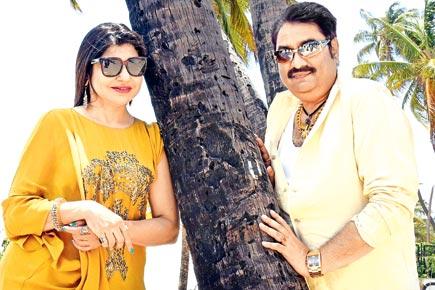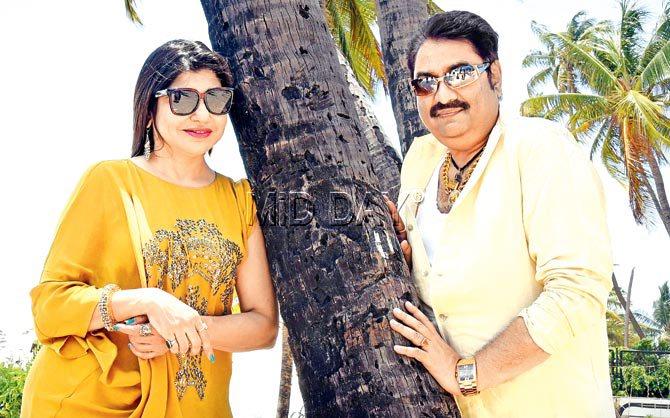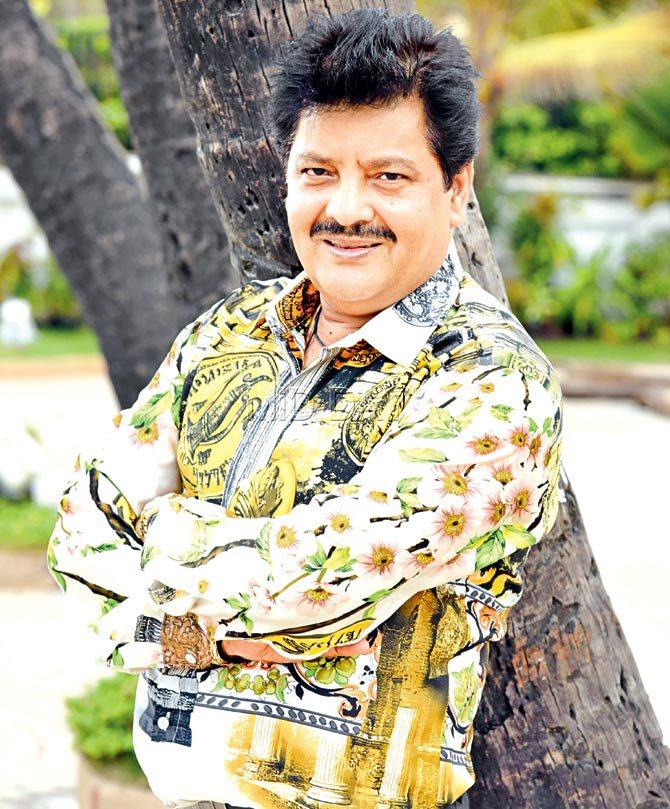The Tridev of '90s playback get together to ruminate on what made the good decade of Hindi film music last beyond its time

Alka Yagnik and Kumar Sanu have sung approximately 5,000 songs together. Location courtesy/Hotel Sea Princess, Juhu; Pic/Shadab Khan

Alka Yagnik and Kumar Sanu have sung approximately 5,000 songs together. Location courtesy/Hotel Sea Princess, Juhu; Pics/Shadab Khan
It's tough to get the three together. Alka Yagnik, Kumar Sanu and Udit Narayan can't seem to get their diaries to be kind to each other. On a day when Yagnik is free, Sanu is in London. We are hoping the logistical nightmare has less do with starry egos and more with being busy two decades after hitting the high notes of celebrityhood.
The trio that ruled Hindi film playback in the 1990s continues to be sought after, whether as singers, guests on television reality shows or as the brand that sells tickets at musical tours abroad. They put all doubt to rest when they come together ahead of mid-day's anniversary edition, to say, "competition tha, but it was always healthy".
Before your lot became the stars of playback, Lata Mangeshkar, Asha Bhosle and Kishore Kumar had ruled the scene. Did you ever imagine that you'd break into the industry, and own it in the manner you did?
Udit Narayan (UN): The era of Rafi saab, Kishore saab, Manna Dey, Mukeshji and Mahendra Kapoor was legendary. I grew up listening to their songs. Their works were like textbooks for me. Back then, it was tough to break into the scene, and make an identity. In fact, getting to a music producer was the most difficult thing. Composers would rarely (be willing) to listen to a new voice. It would take five years to even reach a composer's studio and get his attention.
Alka Yagnik (AY): At that time, there were no reality shows that would get you heard and recognised. It happened one step at a time. And suddenly, I realised that I was singing and recording a whole lot of songs. Ours was not overnight stardom.
Kumar Sanu (KS): I used to sing at a hotel when I first arrived in Mumbai, and I spent all the money I earned on recording songs which I would share with composers. When I managed to break in, Udit Narayan, Abhijeet Bhattacharya, Vinod Rathod, Sudesh Bhosle and Amit Kumar were already around and doing well. They were following Kishore da's style; even I was doing the same. But when I got the opportunity to sing for Aashiqui (1990), I tried to create an identity of my own.
Other than a few noteworthy semi-classical songs and ghazals, the '80s were lacklustre. How did things turn?
AY: It ('80s) was the decade of action films, so music took a backseat. The films had a music score, but that's because no Hindi film released without songs. The phase of romantic films firmly established itself with Aashiqui, and was chased by several other musically rich films.
UN: I'd say Qayamat Se Qayamat Tak changed the game in 1988. Composers like Anand-Milind, Jatin-Lalit, Nadeem-Shravan, Viju Shah and Uttam Singh were instrumental in changing the Bollywood music game. Melody became king. The songs weren't defined by reasoning, ki yeh gaana kyun ban raha hai? The songs complemented the script. That's why they worked, and are still remembered. Mohra's Tu Cheez Badi Hai Mast Mast (1994) still features on playlists.

Udit Narayan
KS: I wouldn't hesitate to say that the 1990s were the best decade for music and melody in the history of Bollywood music. Earlier, Rafi saab or Lataji would record one or two songs in a week. In the '90s, four films released every week. All of them did well musically. Because the music did well, 300 movies managed to release every year. Music was the hero/ heroine of a film. If there were 11 songs in a movie, all of them would do well. The writers and composers back then were magical.
AY: It was also a good fit. We happened to have the sort of voices required at the time. Had we come in today, we would have been wasted.
You would have experienced the orchestra recordings of the '90s.
AY: Yes, initially, we recorded live. But even when we dubbed, we sang the entire antara or mukhda in one go. We couldn't dub a single line. Ek Do Teen for Tezaab (1988) was recorded live with a 40-member chorus and instrumentalists. There, we sang the whole song in one go. Agar kisi ne bhi galti ki — musicians, recordists, singers or even the chorus — we had to sing it all over again. So many people had to get it right, and together!
KS: The mental strength of a singer was put to test. The grandeur and effort shone through in the songs.
UN: The technical understanding of everyone involved was important. Everyone complemented each other. Recordings would last over two days. It was stressful, but we'd look forward to seeing everyone.
Was the competition always healthy?
AY: We — Uditji, Sanuji, Kavitaji [Kavita Krishnamurthy] — would all record together and try to sing better than the rest. That improved the quality of music. These days, the female singer doesn't know who the male singer on the track is. Earlier, an album had an identity because if Uditji was singing for one actor, he would sing all the songs for the star in that film.
If you had to list the taskmasters of the '90s, which composers come to mind?
UN: I had to be careful while working with Laxmikant–Pyarelal, Kalyanji-Anandji and RD Burman saab. Anand-Milind would expect me to sing the way they had composed the song. They didn't like improvisation. But Viju Shah loved experimenting. Nadeem and Shravan were also flexible, but upto a point.
AY: Jatin-Lalit were particular about every note. They wanted what they wanted. The challenge for us was to mould (ourselves) to match the composer's style. It was good to hear them say, "Aap humare liye best gaati hain."
KS: Anu Malik wouldn't allow a singer to dominate the music. I was singing a lot at that time and whenever I'd record the first line, his reaction would be, "Chhee chhee… Sanu, kitna besura gaya. Kya hua tumhe aaj? Koi problem?" That was his style. When the song was done, he'd invariably say, "Bahut achha gaaya." Jatin-Lalit didn't allow improvisation, unlike Bappi Lahiri. Nadeem, too, was accommodating. Shravan would say, "Ek baar phir se kara lete hain, Nadeem," and he'd respond with, "Na, usne jo kar diya woh final hai," and leave the studio. After every recording, when I entered the balancing room, Nadeem would shower money on me.
Favourite song by 'the other'
Sanu
Favourite Alka-Udit song: Gazab Ka Hai Din (Qayamat Se Qayamat Tak)
Alka
Favourite Sanu song: Mera Chand Mujhe Aaya Hai Nazar (Yeh Hai Mumbai Meri Jaan)
Favourite Udit song: Ae Ajnabee Tu Bhi Kabhi (Dil Se)
Udit
Favourite Alka-Sanu song: Chura Ke Dil Mera Goriya Chali (Main Khiladi Tu Anari), Baazigar O Baazigar (Baazigar) and Ghunghat Ki Aad Se (Hum Hain Rahi Pyar Ke)
A '90s song you wished you hadn't sung
Alka Meri Pant Bhi Sexy (Dulaara; 1994)
Sanu Din Mein Leti Hai, Raat Mein Leti Hai (Amaanat; 1994)
Udit None, I am happy with all the songs I sang
The '90s hero/heroine your voice best suited
Alka Madhuri Dixit and Juhi Chawla
Sanu Ajay Devgn, Akshay Kumar, Shah Rukh Khan
Udit Aamir Khan, Shah Rukh Khan, Salman Khan, Akshay Kumar and Anil Kapoor
 Subscribe today by clicking the link and stay updated with the latest news!" Click here!
Subscribe today by clicking the link and stay updated with the latest news!" Click here!








